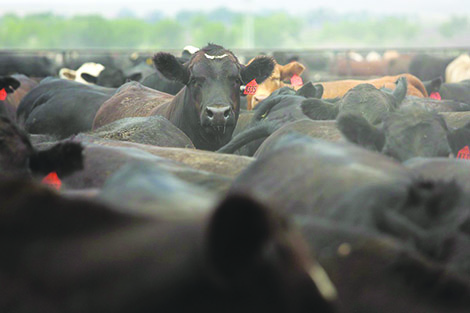It may seem like supermarkets sell a variety of chicken, beef, and pork products, but most of those options come from the same tiny handful of companies.
Consolidation within meat and poultry processing has increasingly concentrated power and profits at the top over the past few decades. Four companies now control more than half of the market in chicken processing (Tyson, JBS, Perdue, and Sanderson), close to 70 percent in pork (Smithfield, JBS, Tyson, and Hormel), and nearly three quarters in beef (JBS, Tyson, Cargill, and National Beef), according to recent analysis.
As advocacy groups see it, this sweeping change has taken place at the expense of farmers, communities, and consumers. And while the federal government has largely taken a hands-off approach—delaying and failing repeatedly to put lasting rules in place to regulate consolidation over the last four decades—industry groups have fought hard against reforms over the years.
Now, real change could be in works. On July 9, 2021, President Biden issued an executive order that included 72 actions to tackle corporate consolidation across a range of industries, including agriculture. On the same day, in conjunction with that order, the U.S. Department of Agriculture (USDA) laid out a multi-pronged plan to increase competition and fairness in the meat and poultry industries. And although the USDA had already signaled some attention to the issue earlier this year, advocates for farmers and ranchers were struck by the historic nature of the actions.
“This is monumental,” said National Farmers Union (NFU) president Rob Larew. “It’s an enormous shift in tone, and we certainly hope that it leads to a restoration of power for farmers in the marketplace.”
Other groups that have struggled for years to get policymakers and administrations to consider the impacts of consolidation on farmers and rural communities put out statements that echoed that sentiment.
“Not since Teddy Roosevelt and Franklin D. Roosevelt has a president taken on corporate power to this extent,” said Joe Maxwell, a Missouri farmer and the president of Family Farm Action Alliance.
“We’ve urged administration after administration for the past 20 years to begin proper enforcement of both antitrust laws and the 100-year-old Packers and Stockyards Act and this is the first administration to actually take action,” said Bill Bullard, a former Montana rancher and CEO of the ranching trade group R-CALF USA.
Meanwhile, industry groups say new regulations are unnecessary and could interfere with markets in negative ways. The North American Meat Institute (NAMI), which represents the country’s biggest meatpackers, criticized the Biden administration’s announcements, with CEO Julie Anna Potts saying the changes would likely “have unintended consequences for producers and consumers.”
The Biden administration’s actions represent a turning of the tides to some, but they’re also just the first steps in processes that can take years and can shift measurably along the way.
One sentiment many farmer advocates share is that while consolidation in meat and poultry is not a new problem, things feel different at this moment for several reasons.
While many agricultural groups have long fought any kind of regulation, Larew said markets in meat and poultry have become consolidated to a point at which the prices that farmers receive are no longer tied to the “true marketplace.” That reality is increasingly impacting the public.
“As bad as it is for farmers and ranchers, it’s also a huge problem for consumers,” he said. “We have a growing disparity between what farmers are receiving and what consumers are having to pay. And in the middle is where the largest packing plants are seeing record profits.”
